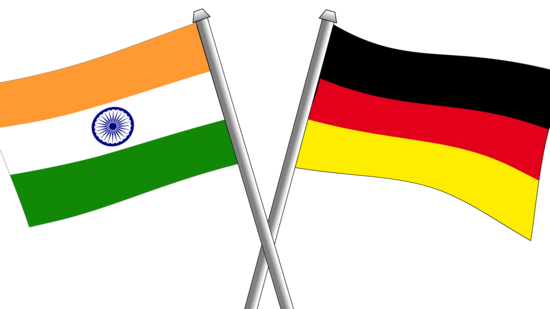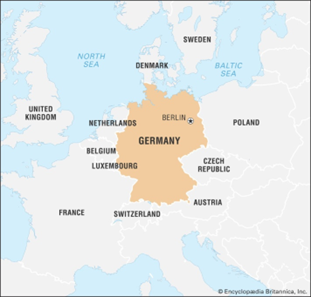Indo-German relations are stronger than ever
While the Germany-India love affair continues to grow in areas of common or strategic interest such as renewable energy, sustainable development, academia, culture, and defence, there’s a lot more the people of both countries can and need to learn from each other
Relevance
- GS Paper 2 Bilateral, Regional and Global Groupings and Agreement involving India and/or affecting India’s Interest.
- Tags: #India #germany #internationalrelations #currentaffairs #upsc
Why in the news?
German Ambassador Philipp Ackermann in a statement suggested how he Sees Bright Future For India-Germany Ties.
Indo-German relations have witnessed a remarkable surge in recent years, strengthening the bond between the two nations across various domains such as renewable energy, sustainable development, academia, culture, and defense. The growing number of people-to-people interactions exemplifies this phenomenon. The Comprehensive Migration and Mobility Partnership, established last year, has acted as a catalyst, drawing students, professionals, and families to Germany. Visa applications now reflect a significant influx of parents, siblings, and close friends visiting their dear ones in Germany.
The Educational Exchange
- Notably, the number of Indian students in Germany has exceeded 43,000, making them the largest group of foreign students in the country.
- Moreover, India holds a substantial presence in STEM-related professions in Germany, with a staggering 635% increase in the last decade. The Indian diaspora has swelled to approximately 247,000, making it one of the top European destinations.
- If we were to gauge cultural integration, Germany boasts five Saravana Bhavan restaurants out of the 11 in Europe, showcasing the growing cultural ties.
Economic Impetus
- The Consulate General in Mumbai has been issuing Schengen visas at an almost double rate compared to the previous year, potentially becoming the second busiest visa section in the global German mission network.
- This burgeoning people-to-people connection mirrors the burgeoning trade ties between the two nations. Bilateral trade between Germany and India surged to over 32.56 billion US dollars last year, positioning India as a pivotal trading partner, surpassing countries like Vietnam and Korea.
- This boost can be attributed to increased imports of mineral oil products from India and the growth of machinery and chemical exports from Germany.
A Resurgence in Trade
- The bilateral trade relationship, once stagnant during the early years of the Modi administration, has witnessed dramatic growth post-pandemic.
- In 2020, the bilateral trade was at 21.76 billion US dollars, marking a significant increase. German companies are experiencing exponential growth in India and are contemplating expansion, reporting double-digit growth rates.
Deepening Political Ties
- India and Germany have cultivated a robust network of political exchange and forums for various experts, politicians, and governments to convene.
- The Indo-German Strategic Partnership, in existence for over two decades, has seen governmental negotiations since 2012. Chancellor Olaf Scholz and Prime Minister Narendra Modi have convened on numerous occasions, both in India and Germany, participating in G7, UN, and other international forums.
- India’s successful G20 Presidency served as a pretext for German officials to engage in discussions on trade, the economy, health, energy, climate, and the environment, as well as experience India first-hand.
Cultivating Deeper Understanding
- Despite the areas of common interest between India and Germany in renewable energy, sustainable development, academia, culture, and defense, there remains room for enhanced mutual understanding.
- Both nations must strive to transcend stereotypes and discover shared values and interests. For instance, while India’s sporting success at the Asian Games is well-known, not many are aware that several prominent athletes trained in small German towns.
- Academic collaboration between India and Germany has deep historical roots, dating back a century when luminaries like Einstein and Bose exchanged ideas on physics. Moreover, Germany played a significant role in India’s cinematic history, with German technicians, set designers, and directors contributing to Bombay Talkies’ early years.
Encouraging Cultural Exchange
- Cultural exchange between India and Germany has taken various forms, and there is still much uncharted territory to explore. The lives of young Indians in Germany remain an untold story, waiting for filmmakers to bring it to the silver screen.
- Mithu Sanyal’s novel ‘Identity,’ shortlisted for the 2021 German Book Prize, is a testament to the burgeoning literary ties between the two nations. The scope for cultural exploration and collaboration is vast, offering opportunities to foster deeper connections.
A Strong Strategic Partnership
- The Indo-German Strategic Partnership, established in May 2000 and fortified by Intergovernmental Consultations in 2011, is a testament to the strong foundation of this bilateral relationship.
- These consultations allow for a comprehensive review of cooperation and the identification of new areas for engagement, a privilege extended to only a select group of countries in Germany.
- The recent meeting between Indian Prime Minister Narendra Modi and German Chancellor Olaf Scholz at the G20 Summit in New Delhi highlights the warmth in their relationship. Scholz’s second visit to India in 2023 underlines the importance of this partnership, and discussions included defense, green and sustainable development, critical minerals, skilled personnel mobility, and education. The leaders also exchanged views on regional and global issues of mutual interest.
In conclusion, Indo-German relations have never been stronger, with personal, economic, and political ties flourishing. This flourishing partnership provides a solid foundation for the two nations to deepen their understanding of each other’s cultures and continue their successful collaboration in various fields.
|
Key Facts About Germany
|
|
Issues Associated with Bilateral Relations Trade Disparity – Germany’s trade with India is a small fraction of its trade with China. – The trade volume between India and Germany remains significantly lower, representing an imbalance. Defence Export Constraints – Despite advanced defense manufacturing capabilities, Germany’s defense exports to India are constrained. – Restrictive arms export policies impede the potential for defense collaboration. Lack of Bilateral Investment Treaty – The absence of a dedicated bilateral investment treaty hampers economic collaboration. – A structured investment agreement is essential for fostering commercial ties. Trade Liberalization Concerns – Germany expresses reservations about India’s trade liberalization measures. – Greater flexibility in labor regulations is seen as a key to facilitating economic cooperation. |
Way Forward
Balanced Trade Growth
- Aim for balanced trade growth between India and Germany to bridge the trade disparity.
- Foster initiatives that encourage bilateral trade to reach its full potential.
Overcoming Defense Export Hurdles
- Work toward overcoming defense export constraints through diplomatic dialogues.
- Seek mutually beneficial arrangements that align with both countries’ defense priorities.
Bilateral Investment Treaty
- Prioritize the establishment of a comprehensive bilateral investment treaty.
- Encourage and protect investments to boost economic engagement.
Trade Liberalization and Labor Reforms
- Collaborate on trade liberalization strategies that address concerns and meet the needs of both nations.
- Explore labor reforms that strike a balance between flexibility and labor rights, promoting economic cooperation.
Leveraging Complementary Strengths
- Recognize the inherent complementarity between India and Germany.
- Capitalize on Germany’s surplus capital, technology, and India’s exportable human capital to foster mutual growth and cooperation.
Sources: Indian Express
Mains Question
“Analyze the factors contributing to the strengthening of Indo-German relations in recent years. Discuss the potential areas for further cooperation and mutual understanding between India and Germany in the context of their strategic partnership.”





